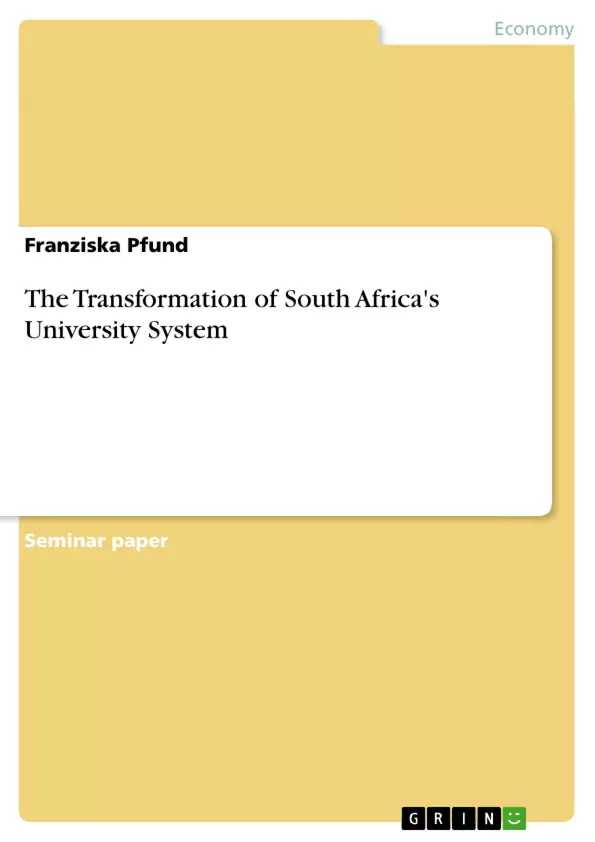In South Africa the transformation of higher education is part of the broad political
and socio-economic transition to democracy characterising the country and its
people. The transformation of higher education is not only a comprehensive process,
but also a radical one. Furthermore, it is a precipitous process – almost daily are
shifts of emphasis and new issues which dominate the higher education debate.
In the second chapter this paper will give an insight in the South Africa’s system of
higher education during apartheid with a special focus on the role that the state
played , as this makes clear the reason for any transformation.
When discussing the transformation of South Africa’s higher education system, the
first item of business involves changing the racial complexion of university student
and staff profiles. Therefore it is necessary to discuss access policies for students
and affirmative action programmes concerning staff policies.
In the fourth chapter future perspectives, such as distance learning programmes, and
challenges will be considered that universities in South Africa are facing nowadays.
The centre of attention are the miscellaneous influences on the higher education
system. Finally, this paper will make clear the importance for South African higher
education institutions to develop a multi-dimensional view of diversity.
[...]
Inhaltsverzeichnis (Table of Contents)
- Introduction
- South Africa's Universities under Apartheid
- The apartheid heritage
- The role of the state
- The Transformation
- The new democratic policy
- Increased Access for Disadvantaged Students
- The language debate
- Affirmative action staffing policies
- Challenges and Future Perspectives
- Distance learning
- Influences on access policies
- International influences
- Social influences
- Economic influences
- A multi-dimensional view of diversity
Zielsetzung und Themenschwerpunkte (Objectives and Key Themes)
This paper examines the transformation of South Africa's university system in the context of the broader transition to democracy. It explores the impact of apartheid on higher education, focusing on the role of the state in shaping and maintaining a segregated system. The paper then delves into the process of transformation, analyzing the new democratic policies, increased access for disadvantaged students, the language debate, and affirmative action staffing policies. Finally, it considers challenges and future perspectives, including distance learning, influences on access policies, and the need for a multi-dimensional view of diversity.
- The legacy of apartheid on South Africa's university system
- The process of transforming South Africa's higher education landscape
- The challenges and opportunities facing South African universities in a post-apartheid era
- The importance of promoting diversity and inclusivity in higher education
- The role of the state in shaping and influencing university policies
Zusammenfassung der Kapitel (Chapter Summaries)
The introduction lays out the context for the paper, highlighting the transformative nature of higher education in South Africa. The second chapter provides an in-depth analysis of South Africa's university system under apartheid, examining the ideological underpinnings of the system and the role of the state in perpetuating racial segregation. It explores the establishment of separate and unequal universities, the impact of apartheid on campus life, and the state's control over university affairs.
Schlüsselwörter (Keywords)
Higher education, South Africa, apartheid, transformation, access, diversity, affirmative action, distance learning, state-university relations, inclusivity.
Frequently Asked Questions
How did apartheid affect universities in South Africa?
Apartheid created a segregated and unequal higher education system based on race, with the state exerting significant control over university policies and access.
What is the goal of the transformation in higher education?
The goal is to move toward a democratic, inclusive, and diverse system by changing student and staff profiles and addressing historical disadvantages.
What are "affirmative action" staffing policies?
These are programs designed to increase the representation of disadvantaged groups among university staff to reflect the country's racial demographics.
What role does the language debate play in South African universities?
The debate focuses on the use of indigenous languages versus English and Afrikaans as mediums of instruction to ensure broader access and cultural inclusivity.
Why is distance learning important for South Africa's future?
Distance learning is seen as a way to increase access to education for a larger portion of the population, overcoming geographical and economic barriers.
- Quote paper
- Franziska Pfund (Author), 2002, The Transformation of South Africa's University System, Munich, GRIN Verlag, https://www.grin.com/document/7724



